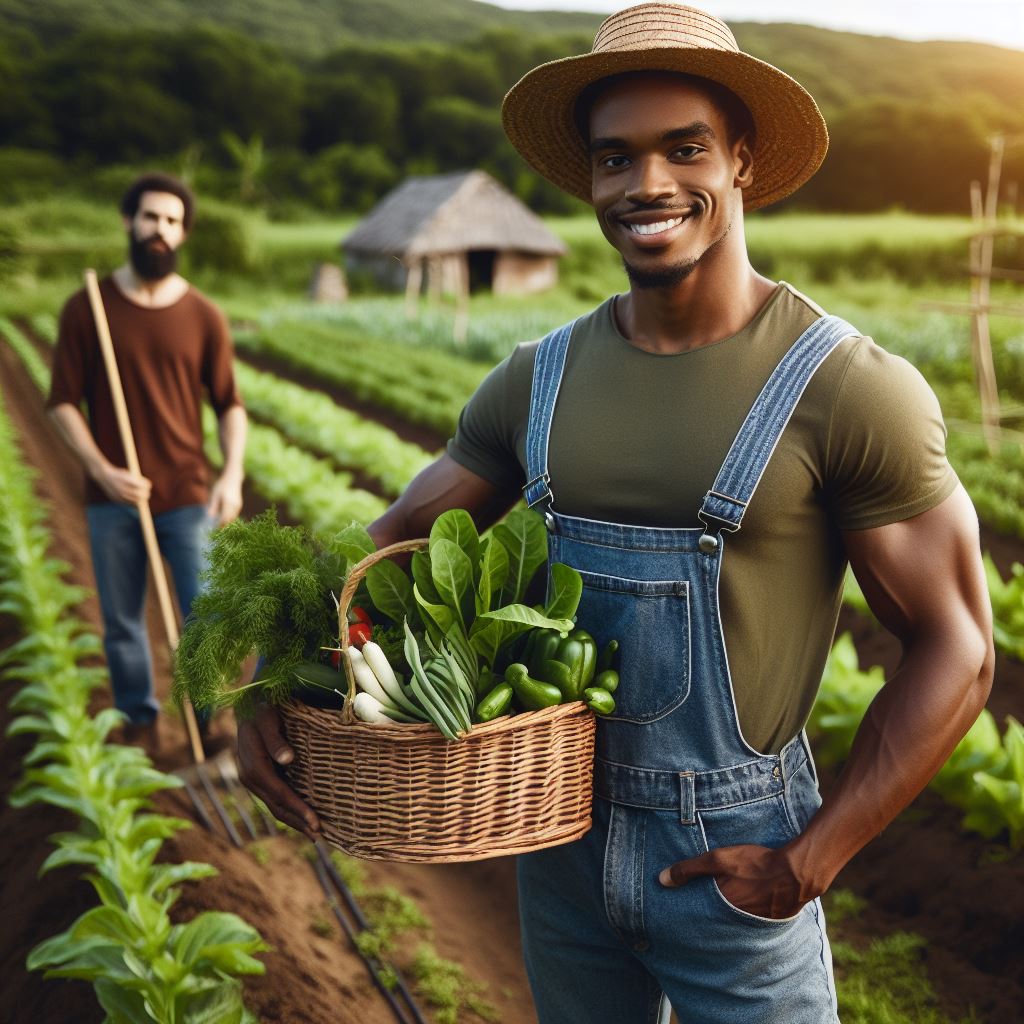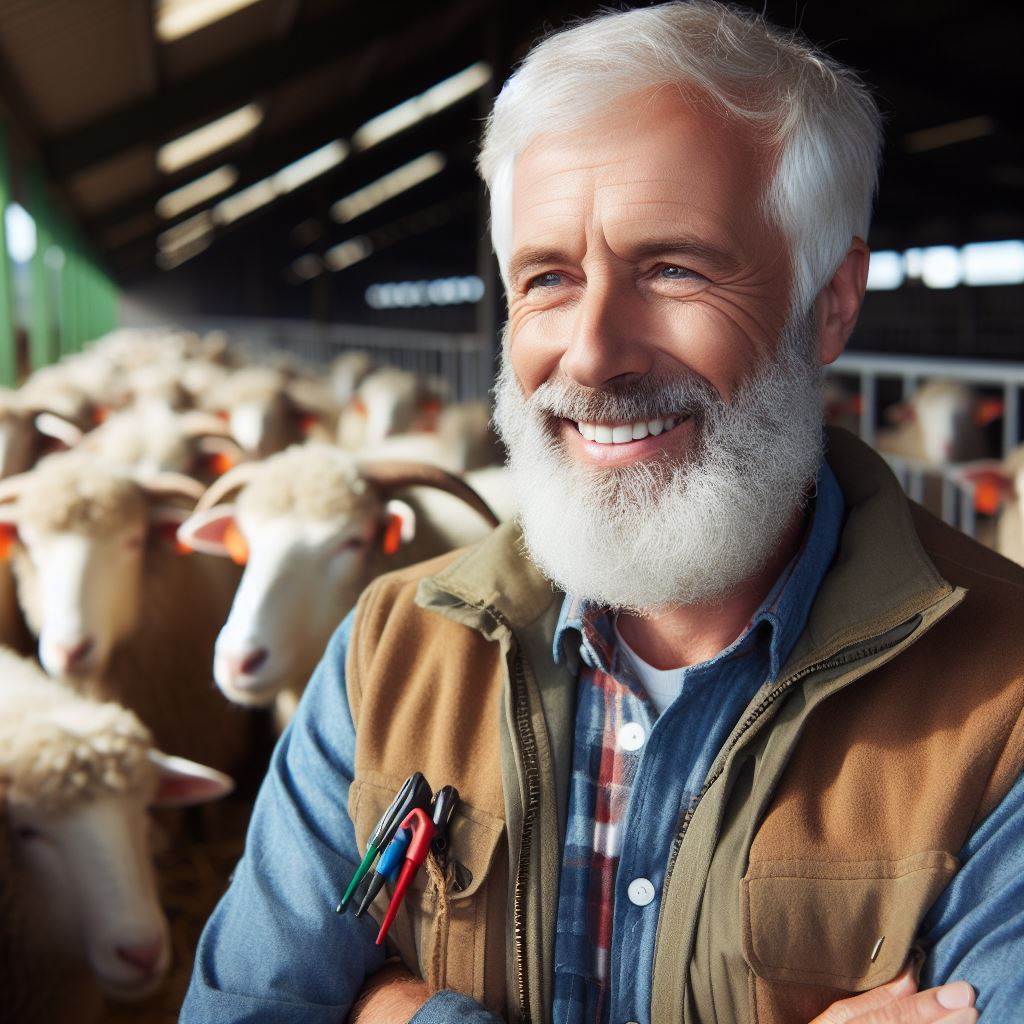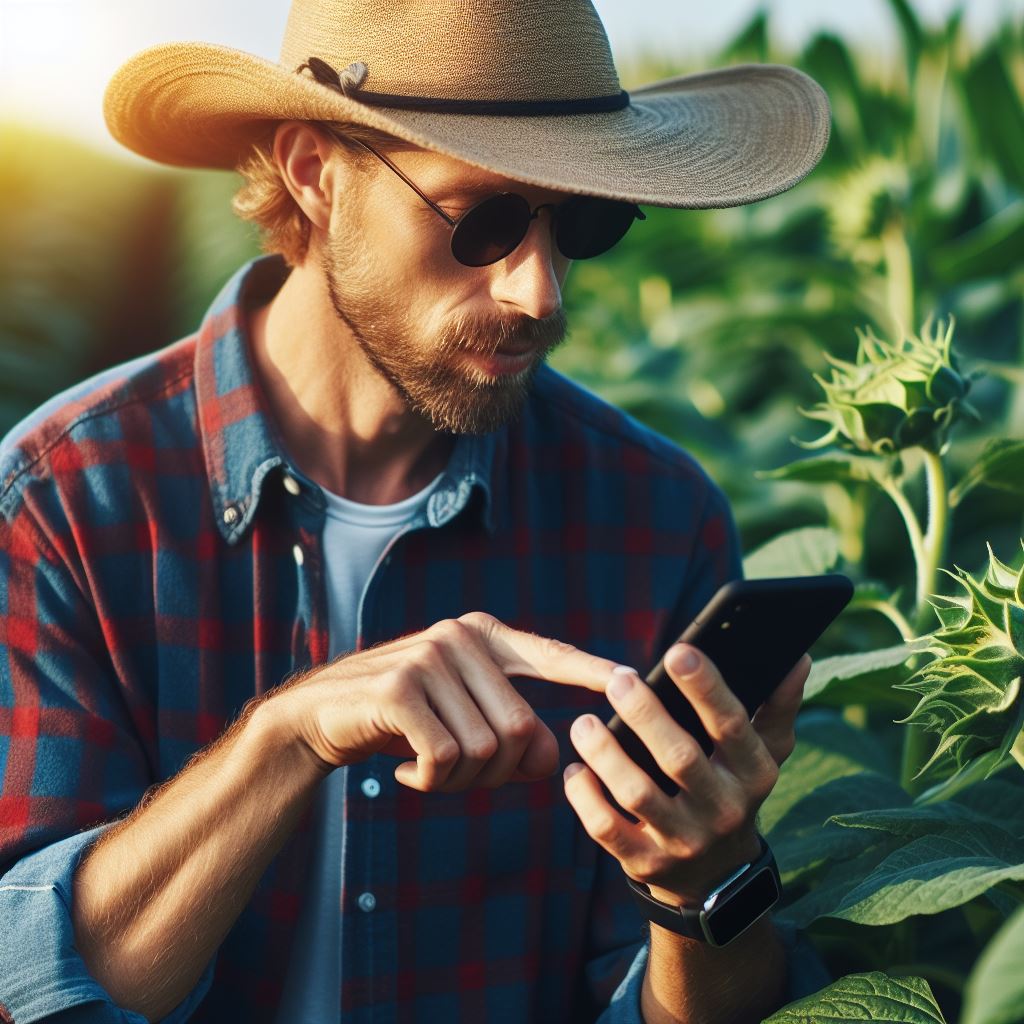Introduction to Sustainable Farming
Definition of sustainable farming
Sustainable farming refers to the practice of agricultural methods that prioritize environmental, economic, and social sustainability.
It aims to produce food while minimizing negative impacts on the earth’s resources.
This type of farming is essential for the long-term health and viability of our planet.
Importance of sustainable farming
The importance of sustainable farming lies in its ability to preserve natural resources, protect biodiversity, and mitigate climate change.
By using techniques such as crop rotation, organic fertilizers, and integrated pest management, sustainable farmers can minimize soil erosion, reduce water pollution, and maintain the overall health of the ecosystem.
Growing awareness and popularity of sustainable farming practices
In recent years, there has been a growing awareness and popularity of sustainable farming practices.
Consumers are becoming more conscious of the impact their food choices have on the environment and are actively seeking out sustainably produced goods.
As a result, farmers are adopting these methods to meet the demand for environmentally friendly and socially responsible products.
Purpose of the blog post
The purpose of this blog post is to guide farmers on achieving a positive return on investment (ROI) through sustainable farming methods.
It will provide practical tips and insights on implementing sustainable practices that can enhance profitability while benefiting the environment.
By following these strategies, farmers can simultaneously improve their financial well-being and contribute to a more sustainable future.
Overall, sustainable farming is not only beneficial for the planet but also for farmers themselves.
By embracing sustainable practices, farmers can ensure the long-term viability of their business while making a positive impact on society as a whole.
The Benefits of Sustainable Farming
Sustainable farming practices offer numerous benefits, not only for the environment but also for society and the economy.
By adopting sustainable farming methods, farmers can play a significant role in mitigating environmental issues and promoting a healthier and more sustainable future.
Transform Your Agribusiness
Unlock your farm's potential with expert advice tailored to your needs. Get actionable steps that drive real results.
Get StartedHere are the key benefits of sustainable farming:
Environmental benefits
Sustainable farming practices focus on reducing pollution and minimizing greenhouse gas emissions.
By using organic fertilizers and natural pest control methods, farmers can minimize the reliance on synthetic chemicals, thus reducing the environmental footprint of agriculture.
Additionally, sustainable farming practices aim to preserve soil health and promote biodiversity by avoiding excessive use of agrochemicals and implementing crop rotation and cover cropping techniques.
Furthermore, sustainable farming practices emphasize water conservation through proper irrigation methods, such as drip irrigation, and the use of water-saving techniques, like rainwater harvesting.
Social benefits
Sustainable farming practices contribute to improved food quality and safety.
By avoiding the use of synthetic pesticides and genetically modified organisms (GMOs), sustainable farmers produce healthier and more nutritious foods.
These practices prioritize the well-being of consumers and promote a healthier lifestyle.
Moreover, sustainable farming supports local communities and economies by fostering direct relationships between farmers and consumers.
Farmers’ markets and Community Supported Agriculture (CSA) initiatives provide communities with fresh, locally grown produce while supporting small-scale farmers.
Economic benefits
Sustainable farming practices can result in significant cost savings for farmers.
By reducing the use of synthetic fertilizers and pesticides, farmers lower their input costs.
Additionally, sustainable farmers prioritize energy efficiency and utilize renewable energy sources, such as solar panels and wind turbines, reducing energy expenses.
Furthermore, sustainable farming opens up access to niche markets where consumers are willing to pay premium prices for sustainably produced goods.
By meeting the demand for organic and sustainably grown products, farmers can command higher prices, resulting in increased profitability.
Moreover, sustainable farming practices focus on long-term sustainability, ensuring the viability and profitability of farming operations for future generations.
In essence, sustainable farming provides a wide range of benefits that go beyond just environmental preservation.
By adopting sustainable practices, farmers can reduce pollution, preserve soil health, conserve water resources, improve food quality, support local communities, and enhance long-term profitability.
As consumers become more conscious of the environmental and societal impacts of their food choices, the demand for sustainably produced goods continues to grow.
It is crucial for farmers to embrace sustainable farming methods to secure a sustainable future for the planet, society, and their own economic well-being.
Read: Agritech in Export: New Trends
Assessing ROI in Sustainable Farming
When it comes to sustainable farming, it is essential to assess the return on investment (ROI) to determine its overall profitability.
However, traditional ROI metrics may not fully capture the benefits of sustainable farming practices.
Traditional ROI Metrics vs. Sustainable Farming ROI
Traditional ROI metrics primarily focus on financial gains and costs. However, sustainable farming ROI requires a broader perspective that encompasses both monetary and non-financial aspects.
Showcase Your Farming Business
Publish your professional farming services profile on our blog for a one-time fee of $200 and reach a dedicated audience of farmers and agribusiness owners.
Publish Your ProfileIn sustainable farming, the benefits go beyond immediate financial returns and include environmental, social, and health advantages.
Therefore, solely relying on traditional metrics can underestimate the true value of sustainable practices.
Factors to Consider when Calculating ROI in Sustainable Farming
Calculating ROI in sustainable farming necessitates considering various factors that go beyond initial costs and financial gains. Some crucial factors include:
Initial Costs of Transitioning to Sustainable Practices
Transitioning to sustainable farming practices may require initial investments in infrastructure, equipment, training, and certifications.
These costs should be factored into the ROI calculations.
Long-Term Benefits and Returns
Sustainable farming practices often lead to long-term benefits such as improved soil fertility, reduced erosion, and enhanced biodiversity.
These long-term returns contribute to the overall ROI.
Potential Market Demand for Sustainable Products
Assessing the market demand for sustainable products is crucial for determining the ROI of sustainable farming.
Consumer preferences and willingness to pay a premium for sustainable produce significantly impact the profitability.
Government Incentives and Support
Government initiatives, such as subsidies, grants, and tax incentives, can positively influence the ROI of sustainable farming.
These incentives help offset initial costs and improve overall profitability.
Importance of Measuring Financial and Non-Financial Aspects of ROI
Measuring both financial and non-financial aspects of ROI is essential for sustainable farming.
While financial metrics provide a quantitative analysis of profitability, non-financial aspects capture the broader impact of sustainable practices.
Non-financial aspects include environmental conservation, social responsibility, and community engagement.
These intangible benefits contribute to the overall success and sustainability of a farming operation.
Therefore, when evaluating the ROI of sustainable farming, it is crucial to incorporate metrics such as carbon footprint reduction, water conservation, wildlife habitat preservation, and public health improvements.
By considering both financial and non-financial metrics, farmers can have a more comprehensive understanding of the value and benefits derived from sustainable farming practices.
This holistic approach helps drive informed decision-making and enhances the long-term viability of the farm.
In general, assessing ROI in sustainable farming goes beyond traditional metrics.
A broader perspective is required to capture the environmental, social, and health benefits associated with sustainable practices.
By considering the factors mentioned above and measuring both financial and non-financial aspects, farmers can make informed decisions that promote sustainability and profitability in the long run.
Read: Green Tech in Farms: Cost Analysis
Strategies for Maximizing ROI in Sustainable Farming
Sustainable farming involves implementing various strategies to enhance return on investment (ROI) while minimizing environmental impact.
By prioritizing soil health management, efficient water management, integrated pest management, and value-added product development, farmers can maximize their financial returns and contribute to sustainable agricultural practices.
Soil health management
One crucial aspect of sustainable farming is soil health management.
By adopting practices like composting and using organic fertilizers, farmers can enrich their soil with essential nutrients and enhance its fertility.
Additionally, implementing crop rotation and cover crops helps prevent soil erosion, maintain soil structure, and improve overall soil health.
Conservation tillage techniques further minimize soil disturbance, leading to better water retention and nutrient availability for crops.
Efficient water management
Efficient water management is another vital pillar of sustainable farming.
The installation of drip irrigation systems allows farmers to deliver water directly to plant roots, minimizing wastage and optimizing water usage.
Rainwater harvesting methods help conserve water by collecting and storing rainwater for irrigation purposes.
Exploring precision agriculture technologies enables farmers to use data-driven approaches to provide crops with the precise amount of water they need, resulting in water conservation and improved crop health.
Integrated pest management
Integrated pest management plays a crucial role in sustainable farming.
By utilizing biological control methods, such as the introduction of natural predators, farmers can control pests without resorting to excessive pesticide usage.
Crop diversification, where a variety of crops are grown, helps reduce the risk of pest infestations and fosters a more resilient ecosystem.
Furthermore, adopting alternative pest control methods like traps or pheromones reduces reliance on pesticides, contributing to long-term environmental sustainability.
Value-added product development
In addition to these practices, farmers can maximize their ROI by focusing on value-added product development.
Incorporating processing and packaging innovations adds value to their agricultural products, allowing for higher profit margins.
Diversifying into organic and specialty product lines enables farmers to tap into niche markets where consumers are willing to pay a premium for sustainably produced goods.
Engaging in direct marketing initiatives and forming local partnerships allows farmers to connect directly with consumers, eliminating intermediaries and increasing profitability.
Showcase Your Farming Business
Publish your professional farming services profile on our blog for a one-time fee of $200 and reach a dedicated audience of farmers and agribusiness owners.
Publish Your ProfileBy implementing these strategies, farmers can not only achieve higher financial returns but also contribute to sustainable agricultural practices.
Sustainable farming is not only financially viable but also environmentally responsible.
With proper soil health management, efficient water usage, integrated pest management, and value-added product development, farmers can make a positive impact on both their ROI and the environment.
Read: Agri Startups: Innovation and Growth

Case Studies: Successful ROI in Sustainable Farming
Organic vegetable farm integrating crop rotation and regenerative practices
- Initial investment and returns: The farm invested in organic certification and regenerative practices, which resulted in higher returns.
- Improved soil health and reduced input costs: By implementing crop rotation and regenerative practices, the farm improved soil health and reduced the need for synthetic inputs.
- Increased market demand and premium prices: The farm’s commitment to sustainability attracted environmentally conscious consumers willing to pay premium prices for organic vegetables.
Sustainable livestock operation implementing rotational grazing and agroforestry
- Initial investment and returns: The livestock operation invested in rotational grazing and agroforestry, leading to increased profitability.
- Enhanced grazing efficiency and reduced feed costs: By implementing rotational grazing, the operation optimized grazing efficiency and reduced the need for expensive feeds.
- Eco-label certification and access to premium markets: The sustainable practices allowed the operation to obtain eco-label certification, opening doors to premium markets.
Small-scale sustainable dairy farm implementing value-added dairy products
- Initial investment and returns: The dairy farm invested in equipment and training to produce value-added dairy products, resulting in higher returns.
- Diversification and increased profit margins: By offering value-added dairy products like cheese and yogurt, the farm diversified its product line and achieved higher profit margins.
- Direct sales and local partnerships: The farm established direct sales channels and formed partnerships with local businesses, creating a sustainable customer base.
These case studies showcase the successful integration of sustainable practices into farming operations, yielding positive returns on investment (ROI).
Investing in organic certification, regenerative practices, and rotational grazing proves lucrative for farmers, offering significant financial gains.
The benefits extend beyond monetary success, encompassing improved soil health, reduced input costs, and enhanced sustainability.
Implementing crop rotation and regenerative practices in organic vegetable farming not only ensures sustainable agriculture but also leads to cost savings.
This commitment attracts niche markets, willing to pay premium prices for organic produce, boosting overall profitability.
Sustainable livestock operations benefit from investments in rotational grazing and agroforestry, improving financial returns and gaining access to premium markets through eco-label certification.
Small-scale dairy farms thrive by incorporating value-added dairy products like artisanal cheese and yogurt.
Despite initial investments in equipment and training, diversification enhances profit margins, fostering customer loyalty through direct sales and local partnerships.
In summary, these case studies affirm the financial viability of sustainable farming practices, emphasizing the positive ROI achievable through organic certification, regenerative practices, rotational grazing, and value-added products.
Read: Efficiency in Agri Supply: Strategies & Tips
Conclusion
Recap of the benefits and strategies discussed
In closing, sustainable farming not only benefits the environment and food systems, but it also has a positive impact on a farmer’s return on investment.
Throughout this blogpost, we have explored the various benefits and strategies associated with sustainable farming.
Importance of adopting sustainable farming practices for long-term success
Adopting sustainable farming practices is crucial for long-term success in the agricultural industry.
By implementing sustainable methods, farmers can improve soil quality, conserve water, and reduce the need for chemical inputs.
Encouragement for farmers to explore sustainable farming methods and calculate their own ROI
We encourage farmers to explore sustainable farming methods and calculate their own return on investment.
This will help them understand the financial advantages and make informed decisions for their farms.
Final thoughts on the future of sustainable farming and its potential impact on food systems and the environment.
Embracing sustainable farming shapes a future with healthy food, environmental preservation. Farmers hold the key to building resilience.
Together, we can create a future where sustainable farming practices are the norm, not the exception.
Let us all make a commitment to sustainable farming for the sake of our planet and the generations to come.




